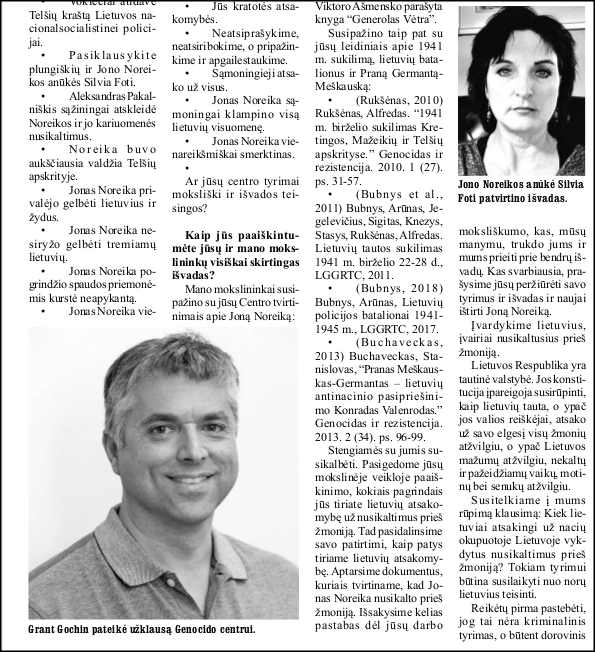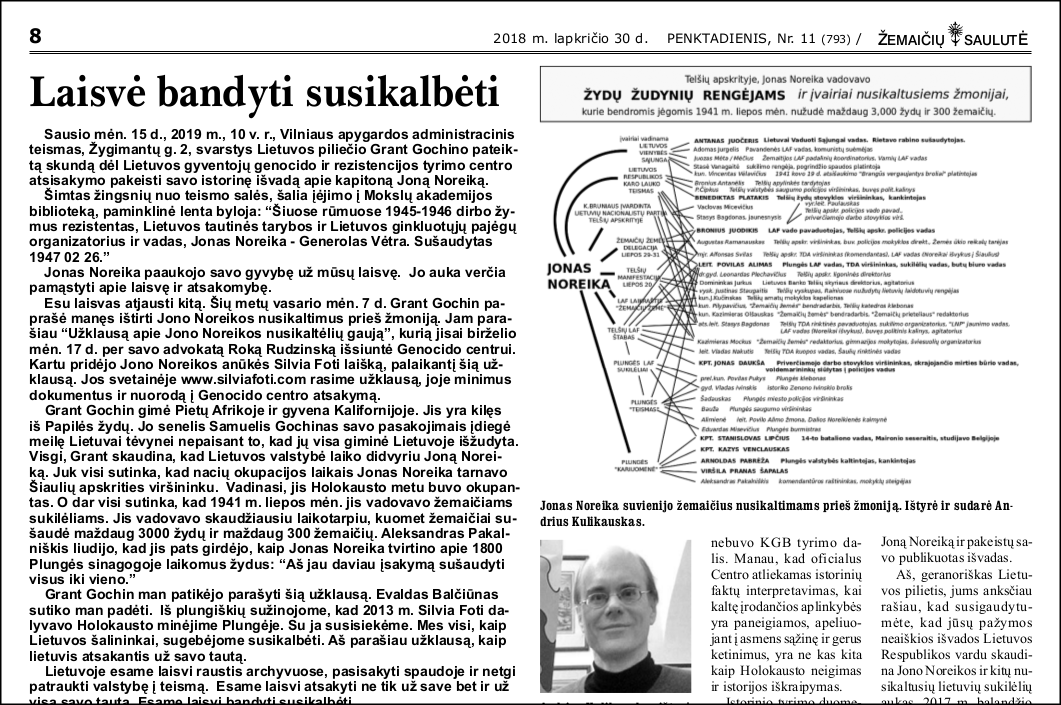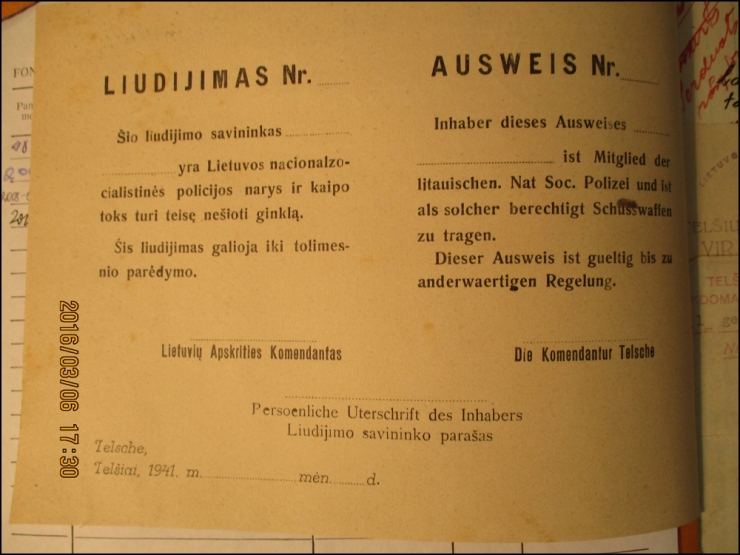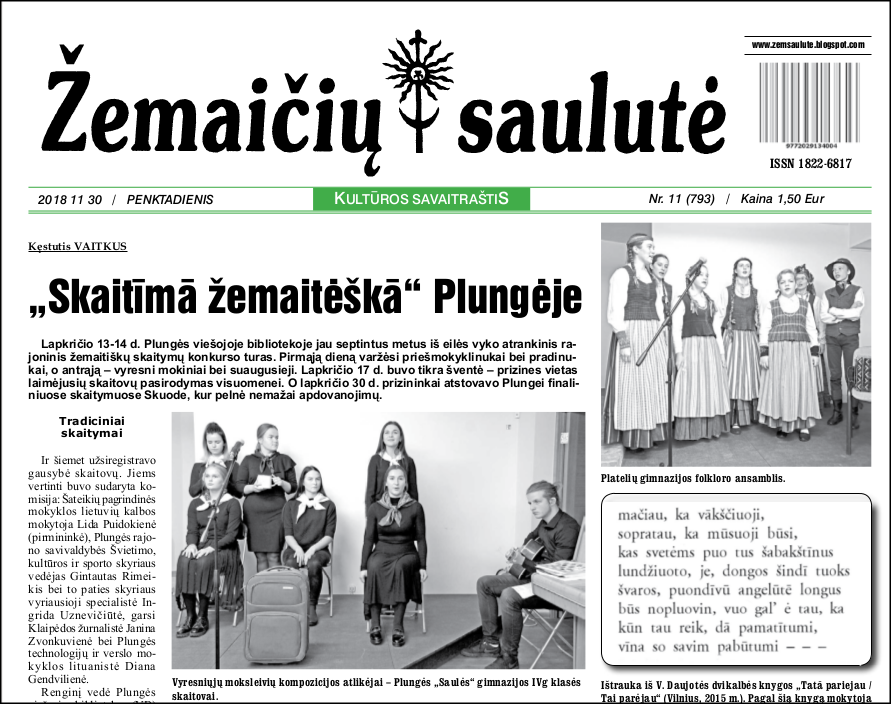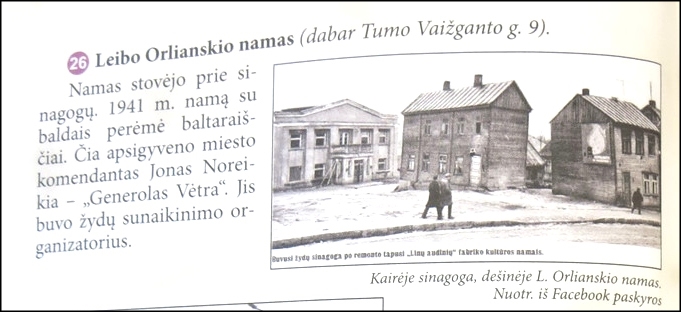OPINION | HISTORY | COLLABORATORS GLORIFIED | CHRISTIAN-JEWISH RELATIONS
◊
by Andrius Kulikauskas
◊
◊
Žemaičių Saulutė (“Samogitians’ Sun”) is an esteemed regional cultural monthly newspaper based in Plungė, Lithuania. It is shattering the silence about Lithuania’s state-sanctioned hero Jonas Noreika’s leadership in the Holocaust in Samogitia. It will print, in eight installments, Grant Gochin’s query to the Genocide Center, which asks, how can the Republic of Lithuania honor Jonas Noreika as an anti-Soviet hero when it acknowledges him as a Holocaust perpetrator?
The issue No. 11, available online, offers the first installment on pages 8 to 10. The article is entitled “The Freedom to Try to Come to an Understanding” (Laisvė bandyti susikalbėti). Here is a translation of the preface by the present author.
◊
The Freedom to Try to Come to an Understanding
On January 15, 2019, at 10:00, the Vilnius Regional Administrative Court, Žygimantų 2, will consider Lithuanian citizen Grant Gochin’s complaint submitted regarding the Genocide and Resistance Research Center of Lithuania’s refusal to change its historical findings regarding Captain Jonas Noreika.
One hundred steps from the court hall, next to the entry to the Library of the Academy of Sciences, a memorial plaque affirms, “In this building, in 1945-1946, worked the renowned resistor, organizer and leader of the Lithuanian National Council and the Lithuanian Armed Forces, Captain Jonas Noreika – General Storm. Executed on 1947 02 26.”
Jonas Noreika sacrificed his life for our freedom. His sacrifice forces us to reflect on freedom and responsibility.
I am free to empathize with another. On February 7th of this year, Grant Gochin asked me to investigate Jonas Noreika’s crimes against humanity. I wrote for him the Query Regarding Jonas Noreika’s Criminal Gang which he sent to the Genocide Center on June 17th through his lawyer Rokas Rudzinskas. He appended Jonas Noreika’s granddaugther Silvia Foti’s letter supporting this query. At her website www.silviafoti.com we can find the query, the documents it mentions and a link to the Genocide Centre’s reply.
Grant Gochin was born in South Africa and lives in California. He is descended from the Jews of Papilė (Yiddish Popilán). His grandfather Samuel Gochin, through his stories, instilled in him a love for his ancestral Lithuania, disregarding that all of his relatives in Lithuania were murdered there. Nevertheless, Grant is hurt that the state of Lithuania holds Jonas Noreika as a hero. For all agree that during the Nazi-occupation he served as Šiauliai District Chief. Which is to say, he was an occupier during the Holocaust. Furthermore, all agree that in July, 1941, he led the Samogitian rebels. He led them in the most painful time, when the Samogitians shot dead about 3,000 Jews and about 300 Samogitians. Aleksandras Pakalniškis bore witness that he personally heard Jonas Noreika assert about the 1,800 Jews held in Plungė’s synagogue, “I have already given the order to shoot every last one of them.”
Grant Gochin entrusted me to write this query. Evaldas Balčiūnas agreed to help me. From the residents of Plungė we learned that Silvia Foti participated in the 2013 commemoration of the Holocaust in Plungė. We got in touch with her. We all, as people on the side of Lithuania, succeeded in understanding each other. I wrote the query as a Lithuanian responsible for my nation.
In Lithuania, we are free to dig through the archives, to speak up in the press and even to take our state to court. We are free to be responsible not only for ourselves but for our entire nation. We are free to try to come to an understanding.
In publishing Grant Gochin’s query, we invite “Žemaičių saulutė” readers to a dialogue. Perhaps some among us can share memories or documents. For example, we have yet to find the rebel newspapers “Laisvieji žemaičiai” from July 1, 1941, nor “Žemaičių žemė” Nr.1 from July 9.
We also invite us to speak up, What kind of dialogue do we desire? What should we learn from the past? What should we share efforts to investigate? How do we imagine Lithuania’s future? How should we create it together? Let us meet some day in Plungė.
Captain Jonas Noreika Museum and Archive Curator Andrius Kulikauskas (but not that famous musician with the impressive hair), ms@ms.lt, +370 607 27 665
◊◊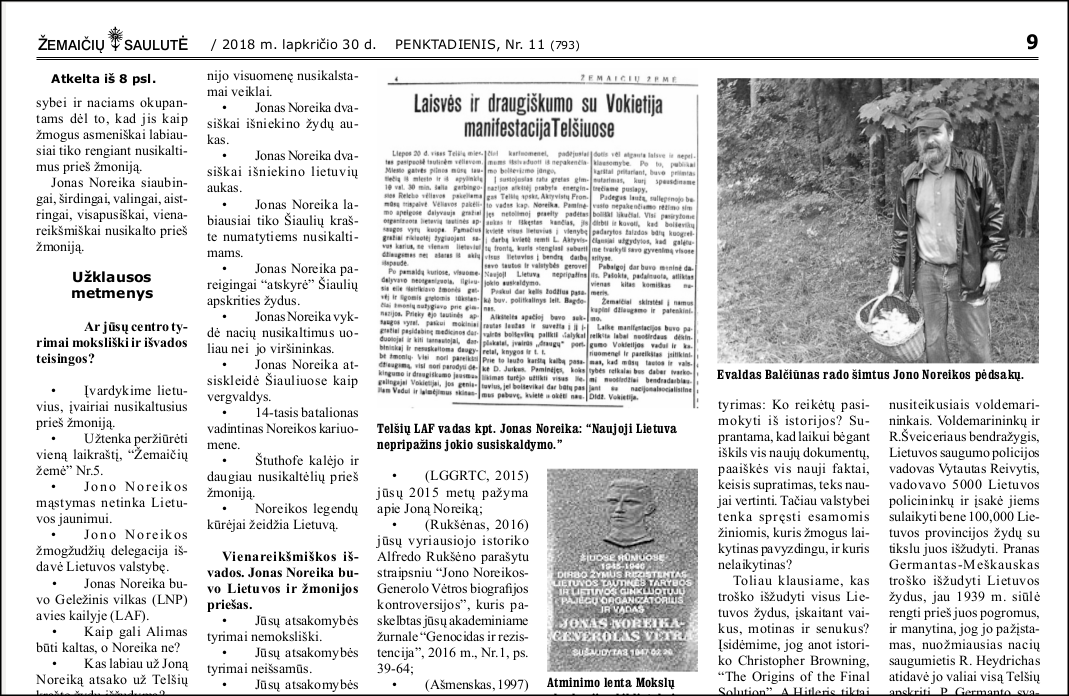
◊
A Victory For and By Lithuania’s Press
The preface is followed by Silvia Foti’s endorsement. The full query has been available online at her website in both the Lithuanian original and in English translation. The latter link showcases dozens of documents mentioned in the query. However, publication in “Žemaičių saulutė” finally enters it into the Lithuanian dialogue.
Silvia Foti wholeheartedly endorsed Grant’s query on July 14, 2018 in her bombshell revelation at Salon.com, one of America’s most esteemed online portals. Her article, My grandfather wasn’t a Nazi-fighting war hero — he was a brutal collaborator, received 16,000 “likes”. Comments were unanimously supportive of her truth, justice and bravery. That was the response from Lithuania’s greatest NATO ally, the USA.
Aleksandras Pakalniškis bore witness that he personally heard Jonas Noreika assert about the 1,800 Jews held in Plungė’s synagogue, “I have already given the order to shoot every last one of them.”
In Lithuania, however, the press was silent for four days. (That is, if we ignore Putin propaganda sites such as bukimevieningi, sputniknews, and ldiena). Then, in a coordinated response, the Genocide Center posted on its website its reply to Gochin’s query, along with a menacing affirmation that he may possibly have violated Lithuania’s Constitution and criminal code. It sidetracked readers with false claims that Gochin made accusations, without evidence, against Provisional Government Prime Minister Brazaitis, Noreika’s biographer Ašmenskas, and bishops and priests of Telšiai diocese. The upshot was that those affected might rightfully sue Gochin. It prefaced this all pointing to “new discussions” about Jonas Noreika, a lengthy article published that very same day at Delfi.lt The article was placed in the “information war” section Demaskuok! and authored by Defense Correspondent Vaidas Saldžiūnas in response to Foti’s relvelations. The second half of the article was a set of unabashed character attacks against Foti, Gochin and Evaldas Balčiūnas.
Who coordinated this defense of Noreika and shares his values? Who is a fan of Hitler, a champion of pro-Nazi “New Lithuania”, and a believer that Hitler will still win World War II? Evidently, the responsible office is the Lithuanian Armed Forces’ Stratcom Department, led by Colonel Darius Petryla, an expert practitioner on Russian Influence in the Baltic States. One of the shortcomings of Lithuania’s fledgling press is its lack of oversight of the army’s efforts in our “information war”. Why did Stanislovas Buchaveckas and Dalius Žygelis of the Genocide Center get away with publishing a 10 page puff-piece in October, 2015 about Jonas Noreika in the Lithuanian Army’s magazine Karys (The Warrior)? How did Damijonas Riauka convince the General Jonas Žemaitis Miltary Academy of Lithuania to publish Noreika’s works, without commentary, including his antisemitic tirade Hold Your Head High, Lithuanian! and his essay praising Hitler’s authoritarianism? Why does the Academy declare that they are meant first of all for Lithuania’s cadets and all youth who dream of being Lithuanian officers? Why is the army school of the Office of Instruction and Doctrine named after General Stasys Raštikis, who translated Kazys Škirpa’s strategy into German for the Wehrmacht, including his plans for ethnic cleansing of Lithuania’s Jews? Here’s the Warrior‘s account of Noreika’s role in the Holocaust:
Already in 1940-1941, in visiting the Klaipėda area, J. Noreika knew about the danger threatening the Jews. Therefore it’s not by coincidence that already, on the first day of the war, he urged a Jewish family in the vicinity of Plungė to “turn at once from the road, and in great haste drive to the village and hide from the German soldiers”. For the danger to this group of people came not only from the German units of executioners, but also from sporadic antisemitic activities by the Wehrmacht soldiers.
The magazine cites this cockamamie story by eyewitness Damijonas Riauka, who adds that German motocyclists had whisked Noreika to Klaipėda, from where he returned with news that Lithuania would not be independent and with official armbands which gave the high schoolers and farmers permission to carry weapons. Noreika continued onward to meet the Telšiai Commandant. Why?
Here are the gun permits issued to the Lithuanian National Socialist Police, to be signed by the Telšiai commandant (LCVA f.1075, a.2. b.19, l.3R.) The permits kept the Wehrmacht from interfering with Lithuanian rebels killing Jews.
The Army magazine continues with a lesson on how and why to collaborate with a totalitarian regime:
Without a doubt, J. Noreika, having come face-to-face with the reality of the Nazi-occupation, could have resigned from his duties as District Chief. This was done by some District Chiefs and other officers of the agencies of little autonomy. However, this person resolved for dangerous duties, for which even during the war years he received reproaches for “serving the Germans”, so as to use these duties, as possible, to defend his fellow nationals’ interests and to expand the anti-Nazi resistance movement. He, like quite a few of the people having weight in society at the time, performed the role of Konrad Wallenrod at his workplace.
Ironically, and most disturbingly, the epithet Konrad Wallenrod is typically reserved for Lithuania’s most authentic Nazi, Pranas Germantas-Meškauskas. He was the only one allowed to use the “Lithuanian National Socialist” brand. He was an acquaintance of Heydrich, the leader of the Nazi security apparatus. So it is reasonable to think that Germantas got permission to print those gun permits and kill all of the Jews, whom he wanted dead, in the Telšiai region, where he was from.
Foti’s article, Gochin’s query and a confirmation of their findings by the New York Times led to dozens of articles in the Lithuanian press. However, they all focused on Noreika’s role in Šiauliai, as if following the Genocide Center’s script. In contrast, Gochin’s query was primarily about Noreika’s role as the leader of a criminal gang of Lithuanian rebels who murdered 3,000 Jews and 300 Lithuanians in the Telšiai region in July, 1941. Nobody in Lithuania’s press linked to Gochin’s query, nobody cited it and, apparently, nobody read it, despite Vilnius Mayor Šimašius’s urging on Delfi TV that they should.
Žemaičių Saulutė has thus cast Noreika’s crimes in the Telšiai region into the national sunlight. Its readership is the elite of Samogitia’s intellectuals, those who care about Samogitia, their culture and their future. They are closest to the consequences of Noreika’s crimes, the destruction of thousands of personalities, as well as the magnificent Samogitian Jewish culture. Bronislavas Pocius and Zita Paulauskaitė wrote to the Genocide Center in 2002, only to be told that “that was a different Jonas Noreika”. This year, with help from Eugenijus Bunka, the Plungė Tourism Information Center published a booklet, Plungės žydų takais (Along the Paths of Plungė’s Jews), with some funding from Lithuania’s Cultural Heritage Department. The booklet includes a photo of Leiba Orlianskis’s house, and states plainly:
The house stood by the synagogue. In 1941, the white-banded rebels took over the house and furniture. Here settled the City Commandant Jonas Noreika — “General Storm”. He was the organizer of the Jews’ annihilation.
Who will argue with the people who know? Locals say that the few Germans at the time of the killings were the wimpy drunkards least fit for fighting, whom the Wehrmacht left behind. Who will argue with Dr. Aloyzas Stonkus, who lived near the site of the murders, and who wrote pages in his memories, how he, as a ten-year-old boy, heard the shooters curse in Lithuanian.
The Germans did not shoot. They were hardly there. They say, those who saw, that all they did was pour cognac, serve it to those who shot Jews, and take photographs.
Gochin’s query is now accepted in august company. The articles in Žemaičių saulutė would not have been published in Soviet-occupied Lithuania. In the current issue, you can read about Lithuania’s national poet Maironis, the philosopher Vydūnas, Samogitian craftswomen and modern artists, and the annual contest for reading in Samogitian. Rev. Andriejus Sabaliauskas commemorates Telšiai Bishop Antanas Vaičius (1926-2008). Presidential candidate Arvydas Juozaitis contributes an essay as well as an excerpt from his drama about Lithuania’s Grand Duchy. In the glasnost era, Juozaitis was the first to assert in the Soviet press that Lithuania was Soviet-occupied.
And then you can read further how Jonas Noreika united “The Land of Samogitia” in crimes against humanity. A diagram put together by Andrius Kulikauskas shows Noreika to be the leader of 9 organizers of mass murder of Jews, including Maironis’s beloved nephew, Captain Stanislovas Lipčius. The diagram also links to another 20 criminals against humanity, including Bishop Justinas Staugaitis, Rev. Vincentas Vėlavičius, Rev. Pilypavičius and Rev. Povilas Pukys. Bishop Staugaitis was the Vice Chairman of the Lithuanian Council which declared Lithuania’s independence in 1918. On July 1, 1941, he organized the funeral of the 73 Lithuanian martyrs whom the Soviets executed at Rainiai forest. During the funeral, innocent Jews were cruelly mocked, abused and tortured. Here is how Ona Algminienė depicted the scene in Raudonasis amaras: Tikrovės romanas (Red Blight: A Reality Novel).
The area around the huge pit, where the 73 martyrs were being buried, was not large enough for all who came, and so the crowd extended up the wide path to the top of the hill. Those who stood on the path facing the grave, following the rites performed with prayers and hymns, were kept from concentrating by another spectacle, which could be seen on the other side of the street, across from the cemetery. That spectacle troubled the already confused thoughts and weighted down all the more upon the beleaguered soul. There on an empty lot, by command of the German military government, during the funeral, all of the Jews from the men’s ghetto were forced to kneel on the ground. Here during the entire time of the burial they had to kneel with their hands held up.
And as the people departed from the cemetery the Jews still knelt there, which many tried not to see. Those who believed that Communism is created by Jews, saw only retribution. Those were mostly mystically inclined Lithuanians, who saw in it a symbol that any wrong done to another sooner or later falls as a blow upon oneself. They were therefore indifferent.
Two weeks later, Jonas Noreika’s deputy Bronius Juodikis led 8 SS men and about 50 Lithuanian partisans in the murder of the 800 Jewish men of Telšiai. And two weeks after that, Noreika included Juodikis in his delegation of 7 leaders from the “Land of Samogitia” to show support for Lithuania’s Provisional Government in Kaunas.
Kristina Paulauskaitė, the editor of Žemaičių saulutė, believes in giving writers the freedom to speak the truth. The opinions of the authors of articles and letters may not concur with the opinion of the editors. Since 1996, the newspaper has been primarily a volunteer effort, and today it is completely so. Years ago, the Open Society Fund contributed some honorariums, but none are paid today. Lithuania’s Press Fund helps cover printing costs.
Lithuania defeated the Soviets by singing and holding hands. But it takes decades of idealistic work to cultivate a vibrant press and a principled democracy. Žemaičių saulutėis evidently the most idealistic, authentic grassroots voice in Lithuania, and certainly the most authoritative to speak the truth about Jonas Noreika’s crimes in Lithuania. The latest article represents, at the most local level, a critical mass for trying to come to an understanding.
◊
Andrius Kulikauskas is Curator of the Captain Jonas Noreika Museum and Archive. For background to the looming court case, see “Holocaust Trial of the 21st Century?” in DH.
◊
SEE ALSO
Evaldas Balčiūnas’s 2012 Defending History essay, “Why is Jonas Noreika Considered a National Hero?” and the Balčiūnas section in DH. Scroll down to May 2014 to follow reports on the campaign by prosecutors and police to harass and discredit Mr. Balčiūnas (esp. reports of 22 May 2014, 4 July 2014, 9 July 2014, 1 Aug. 2014, 28 April 2015, 12 June 2014, 15 Nov. 2015, 17 Jan. 2016, 9 June 2016, 22 July 2016).
